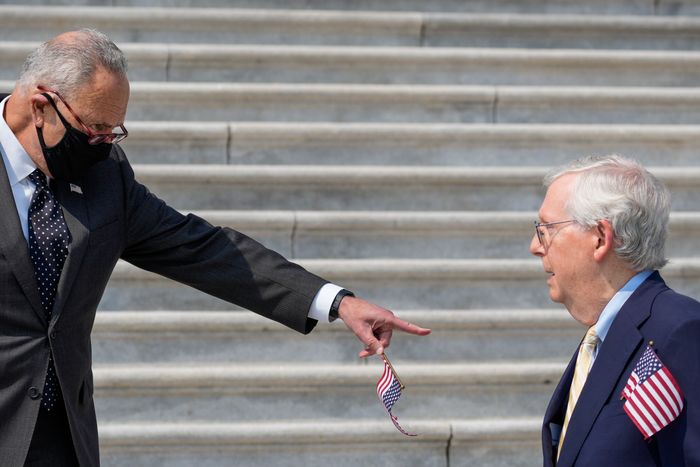
After a looming showdown over the possibility of the United States defaulting on its debt on October 18, Democrats and Republicans have come to a deal to avoid this scenario. But in true Washington fashion, the still-fragile and not-yet-finalized agreement simply proposes to do all this again in two months.
Senate Republican Leader Mitch McConnell has insisted that the debt ceiling can only be raised through reconciliation — the convoluted process that Democrats are currently using to advance their massive social spending bill, the Build Back Better Act. Senate Majority Leader Chuck Schumer has insisted that such a process would take too long, preferring to lift the debt ceiling through regular order.
Needless to say, the process debate is not one of high moral ideas; lacking a better term, it is a pissing match. For McConnell, it served as the latest opportunity to use Senate procedure to his advantage. But Democrats’ behavior was more unusual: They had every reason to fold and give in to the obstructionist’s procedural demands. Currently, Democrats are trying to pass a hugely ambitious legislative agenda with razor-thin majorities in both chambers of Congress. Further, President Joe Biden is trying to manage the ongoing economic recovery from a pandemic that is still killing over 1,800 Americans every day. So why risk a showdown that could plunge the global economy into recession?
The first issue is simply a lack of trust. Democrats insist that even if they give in to McConnell’s demands, he can’t be trusted to expedite the reconciliation process, which contains all sorts of roadblocks that one rogue Republican could exploit to drag out the process and make Democrats take politically unpalatable votes. The result is that they view reconciliation as a dead end that is unlikely to achieve its goal of raising the debt limit before the deadline. Further, raising the debt limit through reconciliation involves increasing it to a specific number. Democrats have been loath to do this because of the potential political implications in 2022, when the vote can be turned into an attack ad with a specific number suggesting fiscal recklessness. In contrast, if the debt limit is increased through a normal vote, it can simply be suspended until a specific time and no dollar figure needs to be voted on.
The second is a simmering resentment toward McConnell: Over a decade of confrontations, he has seemingly created new rules for his political advantage at every turn, a trend that reached an apex with his blockade of Merrick Garland’s nomination to the Supreme Court for close to a full year.
There is also the fear that if Democrats yield to McConnell on this issue, it will embolden him in the future.
In a previous showdown over the debt limit under Barack Obama, the Democrat made far-reaching fiscal concessions to avoid a potential default. After, McConnell described the debt limit as a “hostage worth ransoming.” The fear among Democrats now is that if they give in, they could be forced to negotiate in the future in far less favorable circumstances.
The deal, which was finally settled on Thursday, came after McConnell offered either to expedite the reconciliation process for a longer-term fix, or to provide a short-term increase through the normal legislative process — albeit tied to a “fixed dollar amount” that the debt had to be increased by. His proposal may also have been fueled by the desire to keep the filibuster intact amid renewed Democratic talk to ban the 60-vote threshold needed to move major legislation. “If you compare the debt ceiling, which is raised frequently, to permanently changing the Senate as an institution, it’s not even a close call,” one Republican senator told Axios.
Democrats jumped on McConnell’s offer to deal with the debt in December and hailed it as a victory. “McConnell caved,” Elizabeth Warren said after meeting with her colleagues. Michigan Senator Debbie Stabenow told reporters that “If we can move it to December that just gives us more time to get Build Back Better and the President’s agenda done.”
Democratic senators repeatedly insisted that reconciliation would not be an option down the line, even with the additional time. Chris Murphy of Connecticut argued to reporters that “using reconciliation is a horrible precedent to set because it then will only be done by reconciliation in the future, which will make it even harder to raise the debt ceiling. So, I’m not going to use reconciliation because the precedent it sets is just, is, is horrendous.” Others were more direct in their opposition for using reconciliation to lift the debt ceiling. “It’s [a] hard no for me and I hope for the rest of the Democrats,” Mazie Hirono of Hawaii told reporters.
However, the agreement wouldn’t do much besides kick the can down the road. It simply raises the debt limit by $480 billion. According to the U.S. Treasury, this increase is enough to stave off the threat of a potential default until at least December 3, which is also the date that government funding is set to expire.
In other words, it just pauses the ongoing game of chicken between McConnell and Schumer. There is still the risk of default and of a global financial crisis. No confidence has been built; no lessons have been learned; nothing has changed. Except, of course, for the debt-limit clock on CNN — that just has to be rolled back a few weeks for when Capitol Hill undergoes its next crisis in December.
This piece has been updated throughout.





























